英语一般将来时用法详解
英语一般将来时的用法
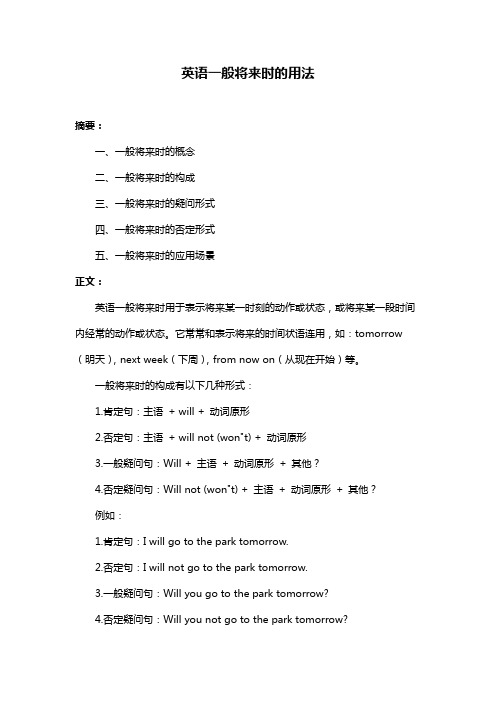
英语一般将来时的用法
摘要:
一、一般将来时的概念
二、一般将来时的构成
三、一般将来时的疑问形式
四、一般将来时的否定形式
五、一般将来时的应用场景
正文:
英语一般将来时用于表示将来某一时刻的动作或状态,或将来某一段时间内经常的动作或状态。
它常常和表示将来的时间状语连用,如:tomorrow (明天),next week(下周),from now on(从现在开始)等。
一般将来时的构成有以下几种形式:
1.肯定句:主语+ will + 动词原形
2.否定句:主语+ will not (won"t) + 动词原形
3.一般疑问句:Will + 主语+ 动词原形+ 其他?
4.否定疑问句:Will not (won"t) + 主语+ 动词原形+ 其他?
例如:
1.肯定句:I will go to the park tomorrow.
2.否定句:I will not go to the park tomorrow.
3.一般疑问句:Will you go to the park tomorrow?
4.否定疑问句:Will you not go to the park tomorrow?
一般将来时在实际应用中非常广泛,可以用于描述未来的计划、预期、愿望等。
高考英语一般将来时用法详解
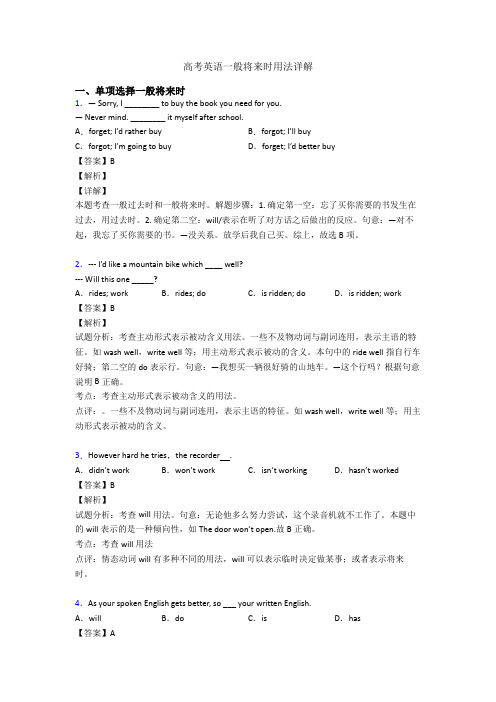
高考英语一般将来时用法详解一、单项选择一般将来时1.— Sorry, I ________ to buy the book you need for you.— Never mind. ________ it myself after school.A.forget; I’d rather buy B.forgot; I’ll buyC.forgot; I’m going to buy D.forget; I’d better buy【答案】B【解析】【详解】本题考查一般过去时和一般将来时。
解题步骤:1. 确定第一空:忘了买你需要的书发生在过去,用过去时。
2. 确定第二空:will/表示在听了对方话之后做出的反应。
句意:—对不起,我忘了买你需要的书。
—没关系。
放学后我自己买。
综上,故选B项。
2.--- I’d like a mountain bike which ____ well?--- Will this one _____?A.rides; work B.rides; do C.is ridden; do D.is ridden; work【答案】B【解析】试题分析:考查主动形式表示被动含义用法。
一些不及物动词与副词连用,表示主语的特征。
如wash well,write well等;用主动形式表示被动的含义。
本句中的ride well指自行车好骑;第二空的do表示行。
句意:—我想买一辆很好骑的山地车。
—这个行吗?根据句意说明B正确。
考点:考查主动形式表示被动含义的用法。
点评:。
一些不及物动词与副词连用,表示主语的特征。
如wash well,write well等;用主动形式表示被动的含义。
3.However hard he tries,the recorder .A.didn’t work B.won’t work C.isn’t working D.hasn’t worked【答案】B【解析】试题分析:考查will用法。
英语一般将来时用法详解
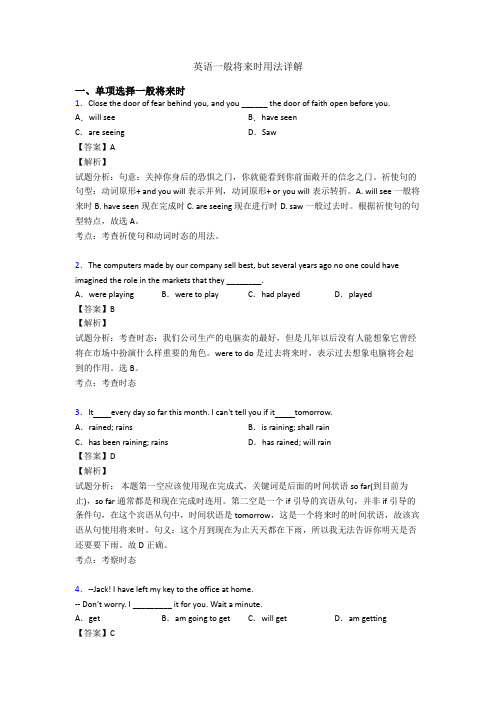
A.mustB.shouldC.willD.can
【答案】C
【解析】
试题分析:句意:谢谢你邀请我们,告诉你妻子她给我们提供了一个完美的聚会。--我会的,再见。Will表示“将会,临时决定,愿意”,must必须,should应该,can能,可能,所以选C。
考点:考察时态
4.--Jack! I have left my key to the office at home.
-- Don’t worry. I _________ it for you. Wait a minute.
A.getB.am going to getC.will getD.am getting
考点:考查祈使句和动词时态的用法。
2.The computers made by our company sell best, but several years ago no one could have imagined the role in the markets that they ________.
【解析】
试题分析:句意:关掉你身后的恐惧之门,你就能看到你前面敞开的信念之门。祈使句的句型:动词原形+ and you will表示并列,动词原形+ or you will表示转折。A. will see一般将来时B. have seen现在完成时C. are seeing现在进行时D. saw一般过去时。根据祈使句的句型特点,故选A。
考点:考查动名词做宾语
10.(东北三校一模)I am certain by no means ________ his word since he has promised an amount of money to the poor.
时态详解:一般将来时
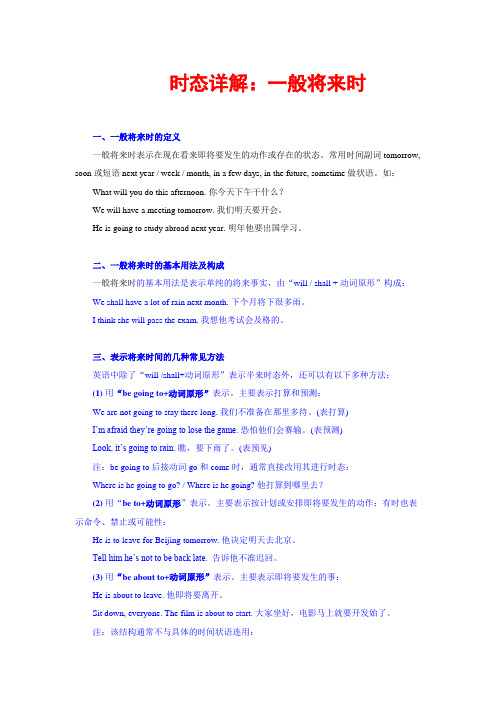
时态详解:一般将来时一、一般将来时的定义一般将来时表示在现在看来即将要发生的动作或存在的状态。
常用时间副词tomorrow, soon或短语next year / week / month, in a few days, in the future, sometime 做状语。
如:What will you do this afternoon. 你今天下午干什么?We will have a meeting tomorrow. 我们明天要开会。
He is going to study abroad next year. 明年他要出国学习。
二、一般将来时的基本用法及构成一般将来时的基本用法是表示单纯的将来事实,由“will / shall + 动词原形”构成:We shall have a lot of rain next month. 下个月将下很多雨。
I think she will pass the exam. 我想他考试会及格的。
三、表示将来时间的几种常见方法英语中除了“will /shall+动词原形”表示半来时态外,还可以有以下多种方法:(1)用“be going to+动词原形”表示。
主要表示打算和预测:We are not going to stay there long. 我们不准备在那里多待。
(表打算)I’m afraid they’re going to lose the game.恐怕他们会赛输。
(表预测)Look, it’s going to rain.瞧,要下雨了。
(表预见)注:be going to 后接动词go和come时,通常直接改用其进行时态:Where is he going to go? / Where is he going? 他打算到哪里去?(2)用“be to+动词原形”表示。
主要表示按计划或安排即将要发生的动作;有时也表示命令、禁止或可能性:He is to leave for Beijing tomorrow. 他决定明天去北京。
最新英语一般将来时用法详解
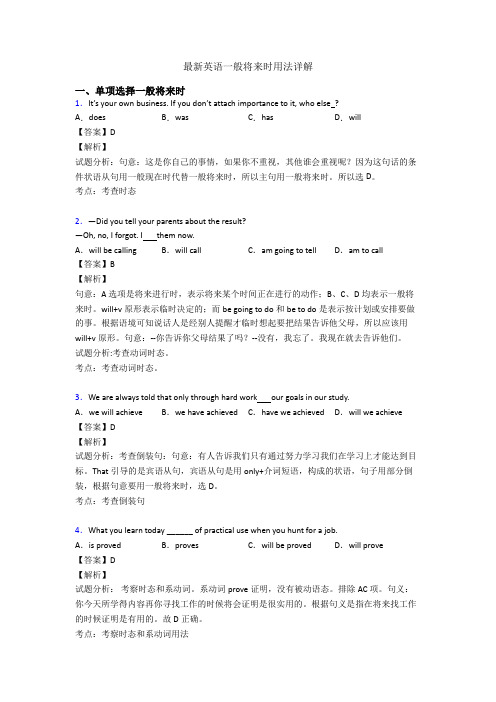
最新英语一般将来时用法详解一、单项选择一般将来时1.It’s your own business. If you don’t attach importance to it, who else ?A.does B.was C.has D.will【答案】D【解析】试题分析:句意:这是你自己的事情,如果你不重视,其他谁会重视呢?因为这句话的条件状语从句用一般现在时代替一般将来时,所以主句用一般将来时。
所以选D。
考点:考查时态2.—Did you tell your parents about the result?—Oh, no, I forgot. I them now.A.will be calling B.will call C.am going to tell D.am to call【答案】B【解析】句意:A 选项是将来进行时,表示将来某个时间正在进行的动作;B、C、D均表示一般将来时。
will+v原形表示临时决定的;而be going to do和be to do是表示按计划或安排要做的事。
根据语境可知说话人是经别人提醒才临时想起要把结果告诉他父母,所以应该用will+v原形。
句意:--你告诉你父母结果了吗?--没有,我忘了。
我现在就去告诉他们。
试题分析:考查动词时态。
考点:考查动词时态。
3.We are always told that only through hard work our goals in our study.A.we will achieve B.we have achieved C.have we achieved D.will we achieve 【答案】D【解析】试题分析:考查倒装句:句意:有人告诉我们只有通过努力学习我们在学习上才能达到目标。
That引导的是宾语从句,宾语从句是用only+介词短语,构成的状语,句子用部分倒装,根据句意要用一般将来时,选D。
英语一般将来时用法详解
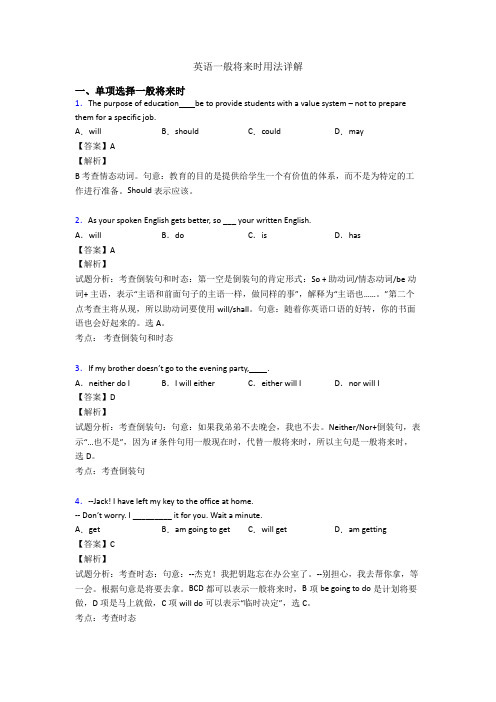
英语一般将来时用法详解一、单项选择一般将来时1.The purpose of education be to provide students with a value system – not to prepare them for a specific job.A.will B.should C.could D.may【答案】A【解析】B 考查情态动词。
句意:教育的目的是提供给学生一个有价值的体系,而不是为特定的工作进行准备。
Should 表示应该。
2.As your spoken English gets better, so ___ your written English.A.will B.do C.is D.has【答案】A【解析】试题分析:考查倒装句和时态:第一空是倒装句的肯定形式:So + 助动词/情态动词/be动词+ 主语,表示“主语和前面句子的主语一样,做同样的事”,解释为“主语也……。
”第二个点考查主将从现,所以助动词要使用will/shall。
句意:随着你英语口语的好转,你的书面语也会好起来的。
选A。
考点:考查倒装句和时态3.If my brother doesn’t go to the evening party, .A.neither do I B.I will either C.either will I D.nor will I【答案】D【解析】试题分析:考查倒装句:句意:如果我弟弟不去晚会,我也不去。
Neither/Nor+倒装句,表示“…也不是”,因为if条件句用一般现在时,代替一般将来时,所以主句是一般将来时,选D。
考点:考查倒装句4.--Jack! I have left my key to the office at home.-- Don’t worry. I _________ it for you. Wait a minute.A.get B.am going to get C.will get D.am getting【答案】C【解析】试题分析:考查时态:句意:--杰克!我把钥匙忘在办公室了。
一般将来时的基本结构和用法
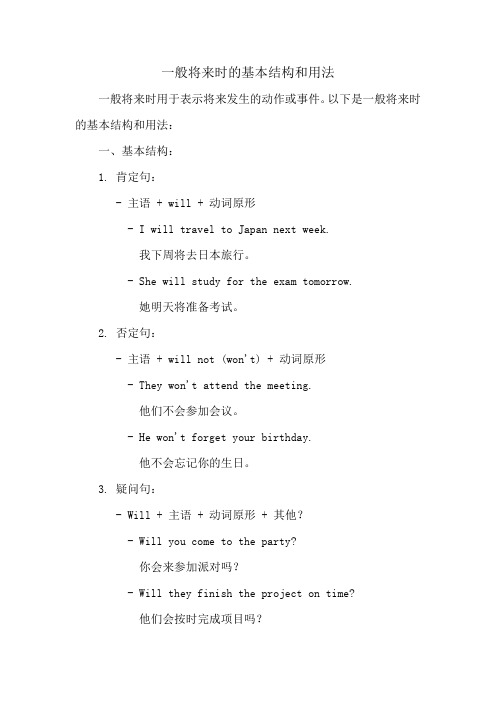
一般将来时的基本结构和用法
一般将来时用于表示将来发生的动作或事件。
以下是一般将来时的基本结构和用法:
一、基本结构:
1. 肯定句:
- 主语 + will + 动词原形
- I will travel to Japan next week.
我下周将去日本旅行。
- She will study for the exam tomorrow.
她明天将准备考试。
2. 否定句:
- 主语 + will not (won't) + 动词原形
- They won't attend the meeting.
他们不会参加会议。
- He won't forget your birthday.
他不会忘记你的生日。
3. 疑问句:
- Will + 主语 + 动词原形 + 其他?
- Will you come to the party?
你会来参加派对吗?
- Will they finish the project on time?
他们会按时完成项目吗?
二、用法:
- 表示将来发生的动作或事件。
- 表示预测、承诺、意图、计划等将来的行为或状态。
- 通常与表示将来时间的时间状语连用,如 tomorrow, next week, in the future 等。
值得注意的是,一般将来时通常用于与将来相关的动作和事件,而对于已经计划或安排好的未来事件,可以使用 "be going to" 结构。
一般将来时态知识点详解(初中英语专项复习) (4)
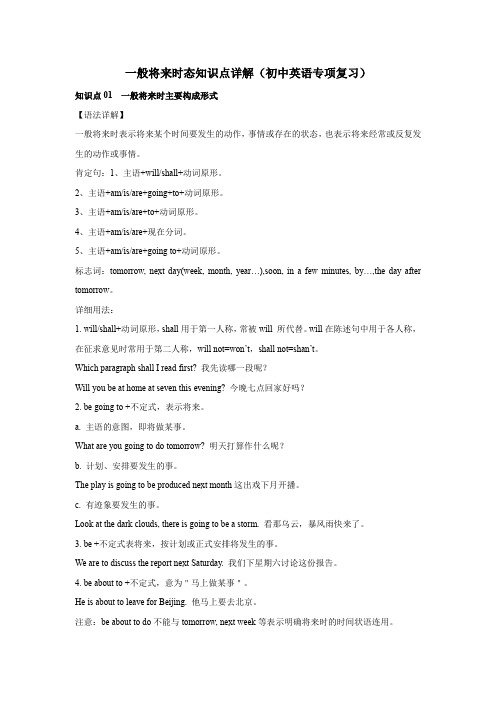
一般将来时态知识点详解(初中英语专项复习)知识点01 一般将来时主要构成形式【语法详解】一般将来时表示将来某个时间要发生的动作,事情或存在的状态,也表示将来经常或反复发生的动作或事情。
肯定句:1、主语+will/shall+动词原形。
2、主语+am/is/are+going+to+动词原形。
3、主语+am/is/are+to+动词原形。
4、主语+am/is/are+现在分词。
5、主语+am/is/are+going to+动词原形。
标志词:tomorrow, next day(week, month, year…),soon, in a few minutes, by…,the day after tomorrow。
详细用法:1. will/shall+动词原形,shall用于第一人称,常被will 所代替。
will在陈述句中用于各人称,在征求意见时常用于第二人称,will not=won’t,shall not=shan’t。
Which paragraph shall I read first? 我先读哪一段呢?Will you be at home at seven this evening? 今晚七点回家好吗?2. be going to +不定式,表示将来。
a. 主语的意图,即将做某事。
What are you going to do tomorrow? 明天打算作什么呢?b. 计划、安排要发生的事。
The play is going to be produced next month这出戏下月开播。
c. 有迹象要发生的事。
Look at the dark clouds, there is going to be a storm. 看那乌云,暴风雨快来了。
3. be +不定式表将来,按计划或正式安排将发生的事。
We are to discuss the report next Saturday. 我们下星期六讨论这份报告。
英语一般将来时用法详解
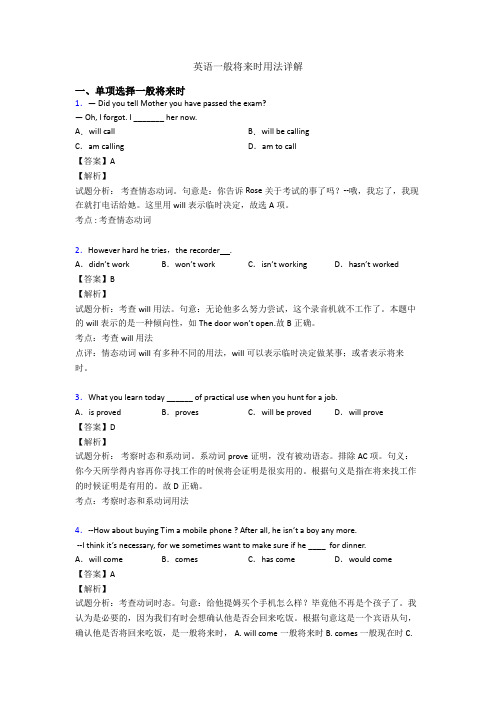
英语一般将来时用法详解一、单项选择一般将来时1.— Did you tell Mother you have passed the exam?— Oh, I forgot. I _______ her now.A.will call B.will be callingC.am calling D.am to call【答案】A【解析】试题分析:考查情态动词。
句意是:你告诉Rose关于考试的事了吗?--哦,我忘了,我现在就打电话给她。
这里用will表示临时决定,故选A项。
考点 : 考查情态动词2.However hard he tries,the recorder .A.didn’t work B.won’t work C.isn’t working D.hasn’t worked【答案】B【解析】试题分析:考查will用法。
句意:无论他多么努力尝试,这个录音机就不工作了。
本题中的will表示的是一种倾向性,如The door won’t open.故B正确。
考点:考查will用法点评:情态动词will有多种不同的用法,will可以表示临时决定做某事;或者表示将来时。
3.What you learn today ______ of practical use when you hunt for a job.A.is proved B.proves C.will be proved D.will prove【答案】D【解析】试题分析:考察时态和系动词。
系动词prove证明,没有被动语态。
排除AC项。
句义:你今天所学得内容再你寻找工作的时候将会证明是很实用的。
根据句义是指在将来找工作的时候证明是有用的。
故D正确。
考点:考察时态和系动词用法4.--How about buying Tim a mobile phone ? After all, he isn’t a boy any more.--I think it’s necessary, for we sometimes want to make sure if he ____ for dinner.A.will come B.comes C.has come D.would come【答案】A【解析】试题分析:考查动词时态。
【备战高考】英语一般将来时用法详解
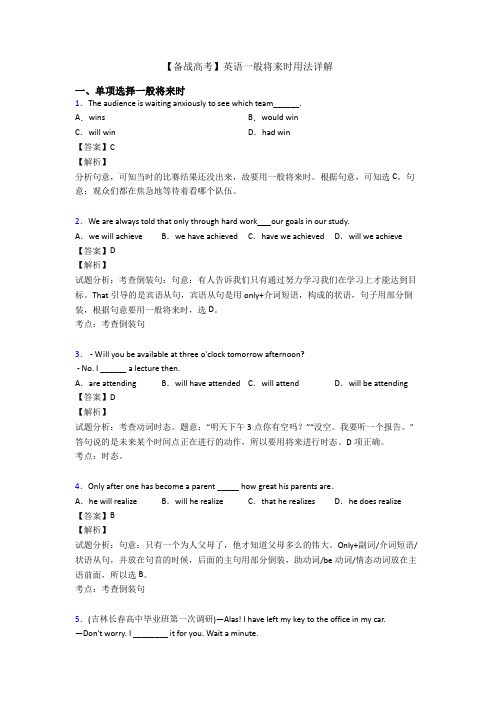
【备战高考】英语一般将来时用法详解一、单项选择一般将来时1.The audience is waiting anxiously to see which team______.A.wins B.would winC.will win D.had win【答案】C【解析】分析句意,可知当时的比赛结果还没出来,故要用一般将来时。
根据句意,可知选C。
句意:观众们都在焦急地等待着看哪个队伍。
2.We are always told that only through hard work our goals in our study.A.we will achieve B.we have achieved C.have we achieved D.will we achieve 【答案】D【解析】试题分析:考查倒装句:句意:有人告诉我们只有通过努力学习我们在学习上才能达到目标。
That引导的是宾语从句,宾语从句是用only+介词短语,构成的状语,句子用部分倒装,根据句意要用一般将来时,选D。
考点:考查倒装句3. - Will you be available at three o'clock tomorrow afternoon?- No. I ______ a lecture then.A.are attending B.will have attended C.will attend D.will be attending 【答案】D【解析】试题分析:考查动词时态。
题意:“明天下午3点你有空吗?”“没空。
我要听一个报告。
”答句说的是未来某个时间点正在进行的动作,所以要用将来进行时态。
D项正确。
考点:时态。
4.Only after one has become a parent _____ how great his parents are.A.he will realize B.will he realize C.that he realizes D.he does realize 【答案】B【解析】试题分析:句意:只有一个为人父母了,他才知道父母多么的伟大。
初中英语一般将来时
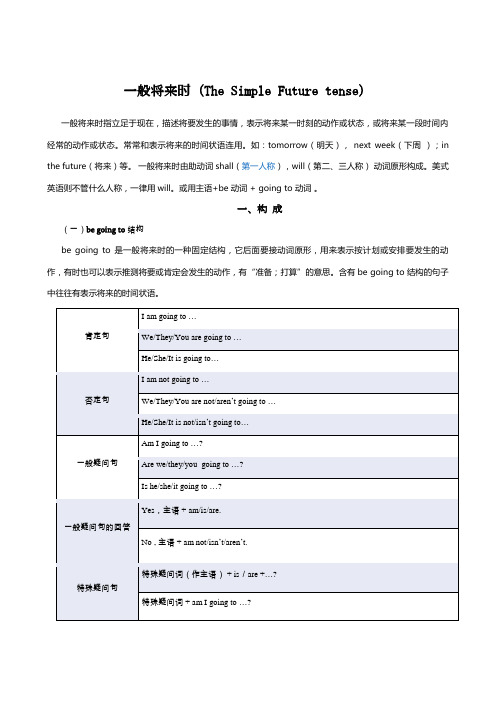
一般将来时(The Simple Future tense)一般将来时指立足于现在,描述将要发生的事情,表示将来某一时刻的动作或状态,或将来某一段时间内经常的动作或状态。
常常和表示将来的时间状语连用。
如:tomorrow(明天),next week(下周);in the future(将来)等。
一般将来时由助动词shall(第一人称),will(第二、三人称)动词原形构成。
美式英语则不管什么人称,一律用will。
或用主语+be动词+ going to 动词。
一、构成(一)be going to 结构be going to 是一般将来时的一种固定结构,它后面要接动词原形,用来表示按计划或安排要发生的动作,有时也可以表示推测将要或肯定会发生的动作,有“准备;打算”的意思。
含有be going to 结构的句子中往往有表示将来的时间状语。
I am going to move to another school next term.下学期我要搬到另一家学校。
He is not going to come to the get-together tomorrow. 他不打算参加明天的聚会了。
——Are they going to leave for Australia next week? 他们下周打算出发到澳大利亚吗?——Yes , they are. / No , they aren’t .是的。
/不。
What are you going to do this evening ?今晚你打算干什么?(二)will 结构I will finish all the housework very soon.我很快就会完成这些家务活。
They won’t move away until tomorrow.他们明天才搬走。
——Will Mr. white give us a lecture tomorrow ?史密斯先生明天给我们作讲座吗?——Yes, he will ./ No , he won’t .是的。
【英语】英语一般将来时用法详解

【英语】英语一般将来时用法详解一、单项选择一般将来时1.The purpose of education be to provide students with a value system – not to prepare them for a specific job.A.will B.should C.could D.may【答案】A【解析】B 考查情态动词。
句意:教育的目的是提供给学生一个有价值的体系,而不是为特定的工作进行准备。
Should 表示应该。
2.The computers made by our company sell best, but several years ago no one could have imagined the role in the markets that they ________.A.were playing B.were to play C.had played D.played【答案】B【解析】试题分析:考查时态:我们公司生产的电脑卖的最好,但是几年以后没有人能想象它曾经将在市场中扮演什么样重要的角色。
were to do是过去将来时,表示过去想象电脑将会起到的作用。
选B。
考点:考查时态3.—Did you tell your parents about the result?—Oh, no, I forgot. I them now.A.will be calling B.will call C.am going to tell D.am to call【答案】B【解析】句意:A 选项是将来进行时,表示将来某个时间正在进行的动作;B、C、D均表示一般将来时。
will+v原形表示临时决定的;而be going to do和be to do是表示按计划或安排要做的事。
根据语境可知说话人是经别人提醒才临时想起要把结果告诉他父母,所以应该用will+v原形。
一般将来时时态用法讲解
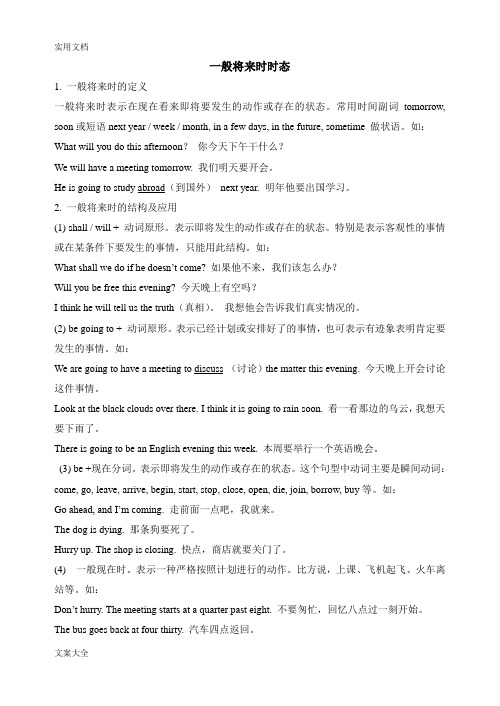
一般将来时时态1. 一般将来时的定义一般将来时表示在现在看来即将要发生的动作或存在的状态。
常用时间副词tomorrow, soon或短语next year / week / month, in a few days, in the future, sometime 做状语。
如:What will you do this afternoon?你今天下午干什么?We will have a meeting tomorrow. 我们明天要开会。
He is going to study abroad(到国外)next year. 明年他要出国学习。
2. 一般将来时的结构及应用(1) shall / will + 动词原形。
表示即将发生的动作或存在的状态。
特别是表示客观性的事情或在某条件下要发生的事情,只能用此结构。
如:What shall we do if he doesn’t come? 如果他不来,我们该怎么办?Will you be free this evening? 今天晚上有空吗?I think he will tell us the truth(真相)。
我想他会告诉我们真实情况的。
(2) be going to + 动词原形。
表示已经计划或安排好了的事情,也可表示有迹象表明肯定要发生的事情。
如:We are going to have a meeting to discuss (讨论)the matter this evening. 今天晚上开会讨论这件事情。
Look at the black clouds over there. I think it is going to rain soon. 看一看那边的乌云,我想天要下雨了。
There is going to be an English evening this week. 本周要举行一个英语晚会。
(3) be +现在分词。
表示即将发生的动作或存在的状态。
最新英语一般将来时用法详解
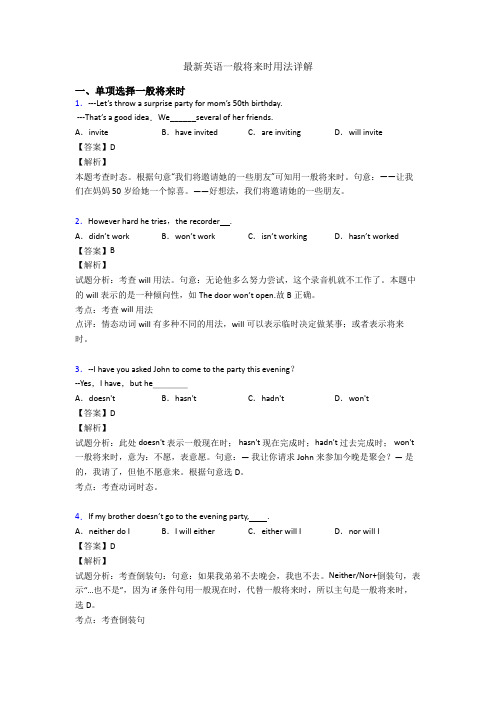
4.If my brother doesn’t go to the evening party,.
A.neither do IB.I will eitherC.either will ID.nor will I
【答案】D
【解析】
试题分析:考查倒装句:句意:如果我弟弟不去晚会,我也不去。Neither/Nor+倒装句,表示“…也不是”,因为if条件句用一般现在时,代替一般将来时,所以主句是一般将来时,选D。
—Sorry, sir. He ________ to a meeting soon.
A.would goB.has goneC.will have goneD.is going
【答案】D
【解析】
试题分析:句意:我今天下午4点能和你们总经理说话吗?---对不起先生,他很快就去开会了。时间是soon,所以用一般将来时,这里用现在进行时代替一般将来时,所以选D。
--Well, we are conducting a comprehensive evaluation of it.
A.investsB.investedC.will investD.would invest
【答案】C
【解析】
【详解】
考查一般将来时。句意:——听说你们公司在未来几年里会投资这个项目,对吧?——嗯,我们正在对它进行全面评估。时间是in the years ahead,也就是未来的几年时间,因此本句为一般将来时。故选C项。
考点:考查情态动词
10.–Are you available at 3 tomorrow afternoon?
--Sorry, I ________ a meeting at that time.
英语一般将来时用法详解
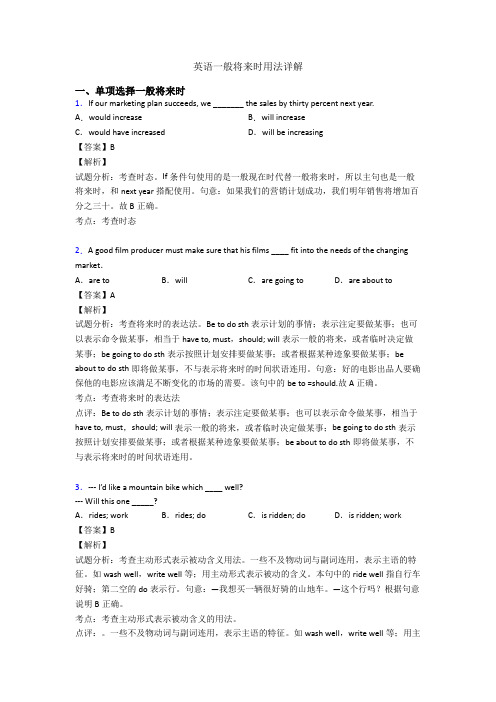
C.will rewardD.will be rewarded
【答案】D
【解析】
【分析】
【详解】
本题考查时态和语态。解题步骤:1.确定时态:根据句尾的in the end可知,事情发生在将来,用将来时。2.确定语态:efforts和reward是被动关系,应该使用被动语态。句意:学生们一直在刻苦学习功课,他们的努力终将会得到回报。综上,用一般将来时的被动,故选D。
【答案】B
【解析】
试题分析:考查will用法。句意:无论他多么努力尝试,这个录音机就不工作了。本题中的will表示的是一种倾向性,如The door won’t open.故B正确。
考点:考查will用法
点评:情态动词will有多种不同的用法,will可以表示临时决定做某事;或者表示将来时。
5.Half the world’s population ______ water shortages within 15 years according to the World Bank, just one of many recent alarming reports on the world’s fresh water supply.
7.We are always told that only through hard workour goals in our study.
A.we will achieveB.we have achievedC.have we achievedD.will we achieve
【答案】D
【解析】
15.—Mike was rushed to hospital last night.Is he all right?
英语一般将来时用法详解
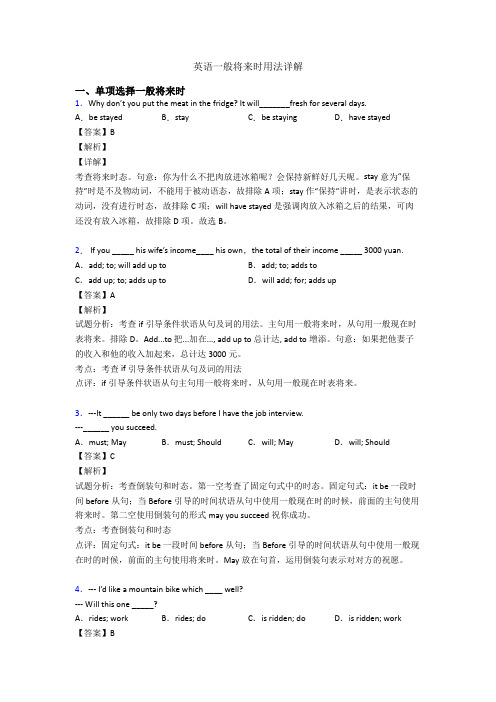
7.--Jack! I have left my key to the office at home.
-- Don’t worry. I _________ it for you. Wait a minute.
A.getB.am going to getC.will getD.am getting
【解析】
【详解】
考查将来时态。句意:你为什么不把肉放进冰箱呢?会保持新鲜好几天呢。stay意为“保持”时是不及物动词,不能用于被动语态,故排除A项;stay作“保持”讲时,是表示状态的动词,没有进行时态,故排除C项;will have stayed是强调肉放入冰箱之后的结果,可肉还没有放入冰箱,故排除D项。故选B。
英语一般将来时用法详解
一、单项选择一般将来时
1.Why don’t you put the meat in the fridge? It will_______fresh for several days.
A.be stayedB.stayC.be stayingD.have stayed
【答案】B
A.rides; workB.rides; doC.is ridden; doD.is ridden; work
【答案】B
【解析】
试题分析:考查主动形式表示被动含义用法。一些不及物动词与副词连用,表示主语的特征。如wash well,write well等;用主动形式表示被动的含义。本句中的ride well指自行车好骑;第二空的do表示行。句意:—我想买一辆很好骑的山地车。—这个行吗?根据句意说明B正确。
【答案】C
【解析】
试题分析:考查时态:句意:--杰克!我把钥匙忘在办公室了。--别担心,我去帮你拿,等一会。根据句意是将要去拿。BCD都可以表示一般将来时,B项be going to do是计划将要做,D项是马上就做,C项will do可以表示“临时决定”,选C。
英语一般将来时用法详解
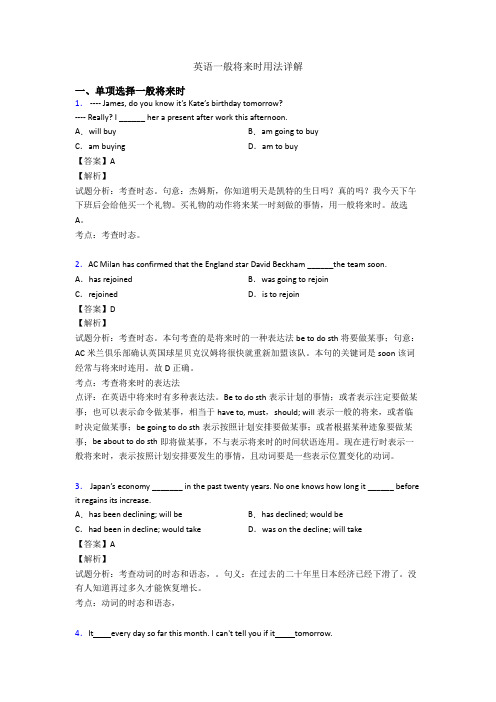
C.rejoinedD.is to rejoin
【答案】D
【解析】
试题分析:考查时态。本句考查的是将来时的一种表达法be to do sth将要做某事;句意:AC米兰俱乐部确认英国球星贝克汉姆将很快就重新加盟该队。本句的关键词是soon该词经常与将来时连用。故D正确。
C.hadn’t showed upD.doesn’t show up
【答案】B
【解析】
试题分析:考查时态。根据语境及时间状语tomorrow afternoon可知用一般将来时。句意:——期望有多少人来参加你明天的宴会?——我送出了30份邀请,但三分之一将不会出现。故B正确。
考点:考查时态
12.Come in and sit down and I ________ you what I've found recently.
A.showB.will show
C.showedD.was showing
【答案】B
【解析】
B考察动词时态。句义:进来坐下,我要给你看我最近发现的东西,祈使句后面接and/or连接陈述句中常常使用一般将来时。故使用will show。故B正确。
A.meetsB.will meet
C.has metD.met
【答案】B
【解析】
B考察动词时态。句意:一种新款的鞋一旦投入市场,将会接到大量的订单,因为这种鞋的鞋跟高度可以在4到9厘米之间变化。If引导的状语从句,主句表示将来,从句用现在时代替将来时。光顾B正确。
11.—How long on earth shall I have to wait?
C.am buyingD.am to buy
【备战高考】英语一般将来时用法详解

【备战高考】英语一般未来时用法详解【备战高考】英语一般未来时用法详解一、单项选择一般未来时1.The purpose of education be to provide students with a value system–not to preparethem for a specific job.A. will B. should C. could D. may【答案】 A【分析】B观察神态动词。
句意:教育的目的是供应给学生一个有价值的系统,而不是为特定的工作进行准备。
Should 表示应当。
2.If my brother doesn’ t go to the evening party, .A. neither do I B. I will either C. either will I D. nor will I【答案】 D【分析】试题剖析:观察倒装句:句意:假如我弟弟不去晚会,我也不去。
Neither/Nor+ 倒装句,表示“ 也不是”,由于 if 条件句用一般此刻时,取代一般未来时,因此主句是一般未来时,选 D。
考点:观察倒装句3.— You’ ve left the light on.— Oh, so I have. _____ and turn it off.A. I go B. I ’ ve gone C. I ’ ll go D. I ’ m going【答案】 C【分析】试题剖析:观察时态:句意:--你向来把灯开着。
--哦,是的,我立刻去,把它关了。
这里用一般未来时, CD 都能够表示一般未来时,will do 能够表示暂时决定,be going to do 打算做,选 C。
考点:观察时态4. - Will you be available at three o'clock tomorrow afternoon?- No. I ______ a lecture then.A. are attending B. will have attended C. will attend D. will be attending【答案】 D【分析】试题剖析:观察动词时态。
英语一般将来时用法详解
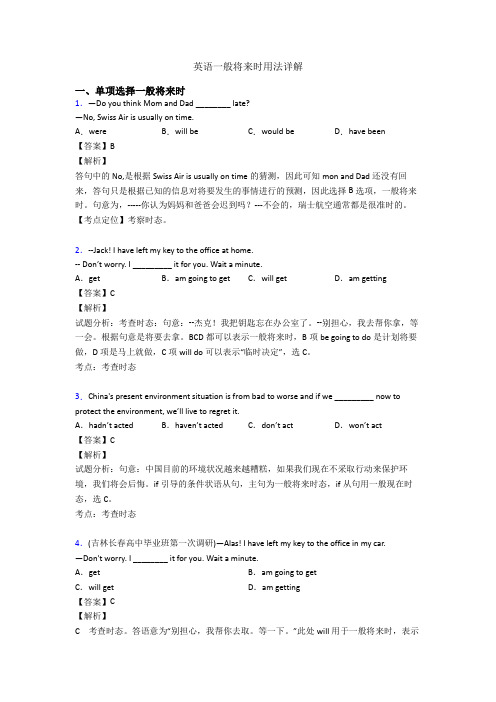
英语一般将来时用法详解一、单项选择一般将来时1.—Do you think Mom and Dad ________ late?—No, Swiss Air is usually on time.A.were B.will be C.would be D.have been【答案】B【解析】答句中的No,是根据Swiss Air is usually on time的猜测,因此可知mon and Dad还没有回来,答句只是根据已知的信息对将要发生的事情进行的预测,因此选择B选项,一般将来时。
句意为,-----你认为妈妈和爸爸会迟到吗?---不会的,瑞士航空通常都是很准时的。
【考点定位】考察时态。
2.--Jack! I have left my key to the office at home.-- Don’t worry. I _________ it for you. Wait a minute.A.get B.am going to get C.will get D.am getting【答案】C【解析】试题分析:考查时态:句意:--杰克!我把钥匙忘在办公室了。
--别担心,我去帮你拿,等一会。
根据句意是将要去拿。
BCD都可以表示一般将来时,B项be going to do是计划将要做,D项是马上就做,C项will do可以表示“临时决定”,选C。
考点:考查时态3.China's present environment situation is from bad to worse and if we _________ now to protect the environment, we’ll live to regret it.A.hadn’t acted B.ha ven’t acted C.don’t act D.won’t act【答案】C【解析】试题分析:句意:中国目前的环境状况越来越糟糕,如果我们现在不采取行动来保护环境,我们将会后悔。
一般将来时使用
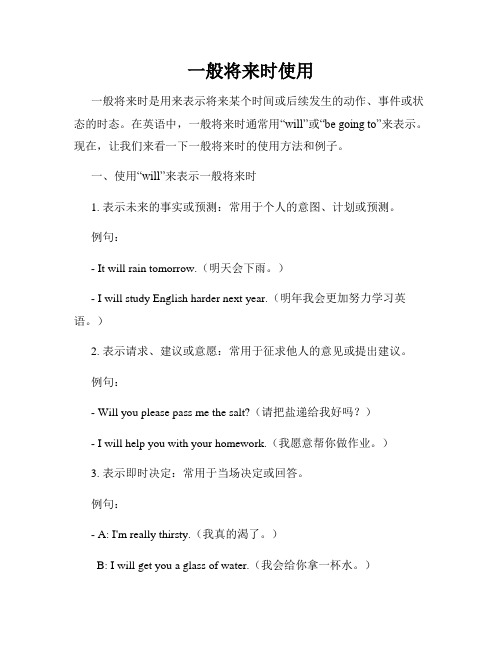
一般将来时使用一般将来时是用来表示将来某个时间或后续发生的动作、事件或状态的时态。
在英语中,一般将来时通常用“will”或“be going to”来表示。
现在,让我们来看一下一般将来时的使用方法和例子。
一、使用“will”来表示一般将来时1. 表示未来的事实或预测:常用于个人的意图、计划或预测。
例句:- It will rain tomorrow.(明天会下雨。
)- I will study English harder next year.(明年我会更加努力学习英语。
)2. 表示请求、建议或意愿:常用于征求他人的意见或提出建议。
例句:- Will you please pass me the salt?(请把盐递给我好吗?)- I will help you with your homework.(我愿意帮你做作业。
)3. 表示即时决定:常用于当场决定或回答。
例句:- A: I'm really thirsty.(我真的渴了。
)B: I will get you a glass of water.(我会给你拿一杯水。
)4. 表示意愿、承诺或威胁:常用于表示个人的意愿、承诺或威胁。
例句:- I will never forgive you for what you've done.(我永远不会原谅你所做的事情。
)- I will always love you.(我将会一直爱你。
)二、使用“be going to”来表示一般将来时1. 表示计划、决定或意图:常用于提到已经计划、决定或打算要做的事情。
例句:- I am going to have dinner with my friends tonight.(今晚我打算和朋友一起吃晚饭。
)- They are going to visit their grandparents next weekend.(他们下个周末打算拜访他们的祖父母。
- 1、下载文档前请自行甄别文档内容的完整性,平台不提供额外的编辑、内容补充、找答案等附加服务。
- 2、"仅部分预览"的文档,不可在线预览部分如存在完整性等问题,可反馈申请退款(可完整预览的文档不适用该条件!)。
- 3、如文档侵犯您的权益,请联系客服反馈,我们会尽快为您处理(人工客服工作时间:9:00-18:30)。
英语一般将来时用法详解一、单项选择一般将来时1. It is required that the students _____ mobile phones in their school, so seldom _____ them using one.A.should not use; you will seeB.mustn’t use; will you seeC.not use; you will seeD.not use; will you see【答案】D【解析】试题分析:考察情态动词。
前一个空中,should表示劝告,义务,建议,命令,其同义词是ought to ,在疑问句中,通常用should代替ought to。
后一个空前面有否定词seldom所以将will提前构成部分倒装。
该句意思为:学生在他们学校被要求不要使用手机,所以你很少看见他们用手机。
根据句意,故选D考点:考察情态动词。
2.If you _____ his wife’s income____ his own,the total of their income _____ 3000 yuan. A.add; to; will add up to B.add; to; adds toC.add up; to; adds up to D.will add; for; adds up【答案】A【解析】试题分析:考查if引导条件状语从句及词的用法。
主句用一般将来时,从句用一般现在时表将来。
排除D。
Add...to 把...加在..., add up to总计达, add to增添。
句意:如果把他妻子的收入和他的收入加起来,总计达3000元。
考点:考查if引导条件状语从句及词的用法点评:if引导条件状语从句主句用一般将来时,从句用一般现在时表将来。
3.“When he _____ is not known yet.” “But when he ____, he will be warmly welcomed.”A.comes, comes B.will come, will comeC.comes, will come D.will come, comes【答案】D【解析】试题分析:考查时态:第一个when引导的主语从句,用将来时,第二个when引导的时间状语从句,用一般现在时代替一般将来时,句意:他什么时候来还不知道。
但当他回来时,他会收到热烈的欢迎。
选D。
考点:考查时态语态点评:时间条件状语从句的时态不能用一般将来时,而用一般现在时代替,考查时态还要注意语态。
4.We are confident that the environment ______ by our further efforts to reduce pollution. A.had been improved B.will be improvedC.is improved D.was improved【答案】B【解析】试题分析:考查时态。
根据“我们相信”说明时间将来发生,所以用将来被动。
【名师点睛】这题考查的是不同时态的被动语态。
关键是确定时态。
要抓住句子的上下文含义和句中的时间状语。
这句话没有明确的时间状语。
这时要根据上下文的语境选择合适的时态,对句意的理解就很关键了。
5. Turn on CCTV news and we ________how happy our life is. But there is no denying that over the past decades, the cost of living ________ sharply.A.are seeing; had increased B.will see;has been increasingC.see; increased D.have seen; is increasing【答案】B【解析】试题分析:考查动词时态。
前句是固定句型“祈使句,and+句子(一般用将来时)”,而时间状语over the past decades是现在完成时态或现在完成进行时态的标志,所以B选项正确。
句意:打开中央新闻联播我们就会看到我们的生活是多么的幸福。
但是不能否认在过去的几十年里,生活费用一直在急剧上涨。
考点:考查动词时态。
6.--- Could you take a message for Mr Brown?--- Certainly. I ________ him about something else in any case. So it _______ any bother. A.may see; isn’t B.see; won’t be C.will see; isn’t D.will be seeing; won’t be【答案】D【解析】试题分析:句意:--你能给布朗先生捎个口信吗?--当然,我要为其他什么事情去见他。
所以这不麻烦。
第一空用将来进行时,表示将来计划,第二空填won’t be“不会”,选D。
考点:考查时态7.—Help me out in the kitchen and I ________ you to a cup of coffee.—Sounds good.A.will treat B.treatC.am treating D.have treated【答案】A【解析】考查时态。
句意:——要是你在厨房里帮我忙的话,我将请你喝咖啡。
——听起来不错。
根据对话语境可知,应用一般将来时。
8.— What do you want for breakfast, Joe?— I think I _______ some bread and milk.A.will have B.am going to have C.had D.am having【答案】A【解析】试题分析:句意:--早饭你准备吃什么?--我想我想吃些面包和牛奶。
因为是将要吃..用一般将来时,排除C,ABD都可以表示一般将来时,will是临时决定,be going to do是计划,打算,be doing是即将,马上做…,所以选A。
考点:考查时态9.(吉林长春高中毕业班第一次调研)—Alas! I have left my key to the office in my car.—Don't worry. I ________ it for you. Wait a minute.A.get B.am going to getC.will get D.am getting【答案】C【解析】C考查时态。
答语意为“别担心,我帮你去取。
等一下。
”此处will用于一般将来时,表示“将要做临时决定的事情”。
10.It's really time I went home but I'm enjoying myself, so I ________ here a bit longer. A.am staying B.have stayedC.stayed D.stay【答案】A【解析】句意:尽管我现在该回家了,但我现在玩得正高兴,因此再多呆会儿。
动词stay可以用进行时表示将来的动作,故选A项。
11.—Mike was rushed to hospital last night.Is he all right?—Really? But don’t worry!I________to the hospital and see him this afternoon.A.will go B.am goingC.have gone D.went【答案】A【解析】从第二人回答的“Really?”可以看出他在此之前并不知道Mike住进医院的事情。
所以,今天下午去医院探视就不会是早就有的计划,所以排除B项。
12.— What do you want for breakfast, Mike?— I think I _______ some bread and milk.A.am going to have B.had C.will have D.am having【答案】C【解析】试题分析:句意:--迈克,你早饭想吃什么?--我想吃一些面包和牛奶。
因为是将来的事情,所以用一般将来时,will表示临时决定,符合句意,be going to计划,打算,be doing 即将做,都不符合句意。
所以选C。
考点:考查时态13.If Kate goes to the gym this weekend, _______.A.so do I B.so I doC.so will I D.so I will【答案】C【解析】试题分析:句意:如果凯特这个周末去体育馆,我也去。
If引导的条件状语从句用一般现在时态表示一般将来时态,主句用一般将来时态;又因为前句说Kate去体育馆,后句说I也去体育馆,故用全部倒装。
故选C。
考点:考查时态和全部倒装句。
14.Turn on the television or open a magazine and you ________ advertisements showing happy families.A.will often see B.often seeC.are often seeing D.have often seen【答案】A【解析】考查“祈使句+and +陈述句”句型。
祈使句相当于一个条件状语从句,and后的陈述句的谓语用一般将来时,这是一个较为固定的句型。
15.Only when you can find peace in your heart _____good relationships with others.A.will you keep B.you will keep C.you kept D.did you keep【答案】A【解析】试题分析:考查倒装结构用法。
only修饰句子的状语(从句)位于句首时,句子的主句要用部分倒装。
结构为:only+状语/状语从句+ be/ 助动词/情态动词+主语。
根据从句的can可以排除D项。
句意:只有当你在你心中找到宁静的时候,你才会与其他人保持好的关系。
故A正确。
考点:考查倒装结构用法16.Mrs. Morris has left for London. She ________ a speech there next week.A.has given B.will give C.gives D.gave【答案】B【解析】【详解】考查时态。
句意:Morris女士已经去伦敦了。
她下周将在那儿做一次演讲。
